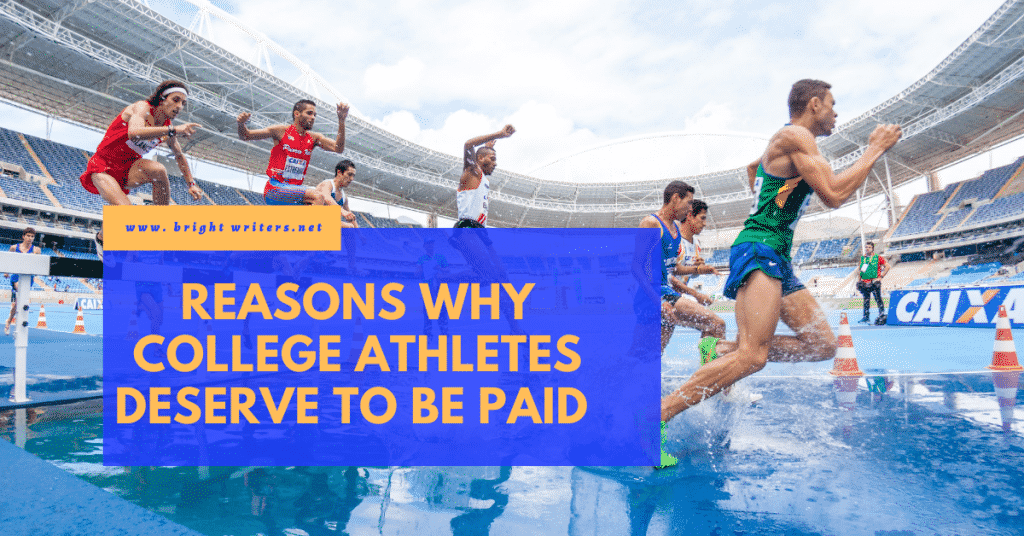The National College Athletic Association (NCAA) had long prohibited college institutions from paying to preserve amateurism. This is because NCAA does not consider college athletes as professionals, and therefore, colleges do not have to compensate them. They also claim that paying college athletes defeats the purpose of college, which is education. However, given the billions that these college athletes generate for their schools, all sides should accept that some sort of compensation is not only fair but inevitable. As much as the debate around this topic is huge, continue reading to learn why college athletes should be paid.
Top 10 reasons why college athletes should be paid
Athletes give their schools valuable exposure
The achievements of college athletes translate into fame and higher status for their colleges. For example, Shareef O’Neal, an LSU Tigers Basketball player, has brought exposure to Louisiana State University. This means the college can attract more academic and sports talent and increase its tuition fees due to its popularity. It also gives the colleges a chance to be more selective in their admission process and get more recognition.
Schools get bonuses for doing well in specific sports
College athletics, specifically football and men’s basketball, are major revenue generators for their colleges. Everyone around the college athletes makes money but them. To the truly honest, this is a blatant form of exploitation. Suggestions such as incorporating athlete compensation packages as part of television contracts could fund some compensation.
Provides motivation to play
Everyone works well when there is compensation. NFL players are usually paid based on their worth and performance. Therefore, if colleges give these athletes financial compensation, they will feel motivated to raise their level of performance. Moreover, the students will feel less stressed about their financial situation; hence they can focus more on the games without money anxiety. This justifies why college athletes should be paid.
Playing is equivalent to working
Different statistics suggest that college athletes spend at least 40 hours per week on their sports. This includes games and training sessions when they are off or on the season. Being an athlete is like working a full-time job on top of demanding courses, assignments, and other school responsibilities. Since most athletes join colleges through scholarships, they have to work intense hours to remain on the team. The college athletes deserve to be paid for their efforts for all the time they put into ensuring their team’s success.
Sports take away time from studies
For an athlete to be a pro, they have to prioritize sports, which leads them to put fewer hours into studying than non-athletes. Most college athletes spend as much time on sports during the off-season as they do during the season. It leaves them little time for common student activities like studying, internships, and part-time jobs. Therefore, this impacts their academic performance with long-term effects on their future professional career.
The potential from injury makes compensation necessary
It is inevitable to get an injury as an athlete. Athletes constantly risk injury, therefore, deserve proper compensation. If an athlete gets a severe injury, they could lose their scholarship, jeopardize their opportunity to play professionally, and potentially earn millions or even a long-term disability if the damage is permanent. Besides, allowing players to receive pay would allow them an opportunity to save in case of a permanent injury or lingering effects from athletic participation.
Athletes need money for their expenses
Most college athletes are on full scholarships. So the institution covers their tuition, college fees, and accommodation. However, college is still expensive because there are other expenses that students must cover with their money, for example, clothes and food. Usually, most students do part-time jobs to cover these expenses, but they can’t find time to do that since college athletes are busy. Therefore it is only fitting to compensate them for their time.
Reduce corruption in college athletes
This is perhaps the most important reason why institutions should pay college athletes. Some agents, coaches, and boosters conspire and pay recruits to join certain colleges. Paying high school athlete students is an illegal act and it should stop. The best way to stop this practice is to pay them. When college athletes know they’ll get paid in whichever university they choose, they won’t allow themselves to be manipulated into receiving small pay to play for a particular school.
Lowers the financial burden of tuition
When college athletes are paid, there would be increased competition among colleges to pick the best athlete. These colleges would have to improve their facilities to be able to encourage enrollment and accommodate the athletes. Moreover, they have to set affordable tuition fees to encourage college athletes with no scholarships to enroll.
Helps retain students for longer
The top priority of every college student is earning their degree. However, students who plan to go pro in athletics may consider college a barrier to their career. If college institutions pay these athletes, many will be willing to stay longer in college and finish their degrees. This is helpful in cases where the student athlete’s career comes to a stop, and they need something to fall back into
Should college athletes be unionized?
This question has been a constant debate between the NCAA and Murphy-sanders. However, Yes, they should be unionized because it would make them employees hence eligible for payments. Moreover, unionization would provide a formal forum for airing out grievances, improving their rights and working conditions in college sports.
How much are college athletes paid?
College athletes can now profit off their name, image, and likeness (NIL). They can solicit endorsement deals and make money off their social media. Therefore, division I players have been earning $471 on average. According to research, this could also lead to more than $1.5 billion in earnings for NCAA athletes in 2021.
Who should pay college athletes?
Under the NCAA rule change, college athletes get paid from their social media accounts, broker endorsement deals, autograph signings, and other financial opportunities. Moreover, they have to use an agent or representative to do so. In addition to partnerships, many athletes will use their brands mainly built on social media to earn some money. For example, LSU gymnast Olivia Dunne just launched a billboard in Times Square.



